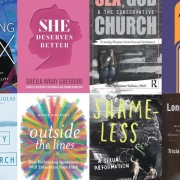How I learned to stop obsessing over lust and you can too
This article originally appeared at Baptist News Global on January 9, 2025.
This second week of January is likely hard for plenty of evangelical men who made New Year’s resolutions not to lust. I know, because I used to be one of them.
Even President Jimmy Carter had to deal with this. In a 1976 interview with Playboy, Carter famously admitted to “lust” and committing “adultery many times in my heart.” Comedians and journalists went after him for admitting it, with one cartoon showing Carter lusting after the Statue of Liberty. According to Carter, it became “the No. 1. story of the entire 1976 campaign” and “nearly cost me the election.”
Processing New Year’s resolutions about their human struggle with lust is an experience many evangelical men have on an annual basis. It causes great stress as the shame and desires build seemingly out of their control.
Having spent over 37 years of my life in conservative evangelicalism, I know this struggle. But ironically, it’s no longer an experience for me since deconstructing my evangelical theology.
If you’re still an evangelical, you’re probably thinking that’s because I left my theology behind in order to have nonstop sex with hundreds of women. After all, the desire to sin is what organizations like The Gospel Coalition claim about those of us who deconstruct. But while that’s an effective form of fear mongering, it’s not true of my experience.
Of course, I’m not a professional therapist. I have no training in human sexuality beyond what might be covered in an occasional seminary class. But what I do have is experience going from being overcome with fear about lust to hardly ever thinking about it.
“What I do have is experience going from being overcome with fear about lust to hardly ever thinking about it.”
Here are 10 practical ways evangelical men can move toward freedom and sexual health, rather than continuing to spiral out of control over another year of inevitably wrecked resolutions.
Recognize how evangelical theology has created a false sexuality binary.
You may have noticed how my introduction to this article focused on the sexuality of men and completely ignored the sexuality of women. That’s because in the world of evangelicalism, this tends to be the binary. Men are seen as visual, desperately sexual creatures, while women are considered to be mostly nonsexual and needing to be emotionally prepped first before the rare moment of wanting sex.
In the book Every Man’s Battle: Winning the War on Sexual Temptation One Victory at a Time, Stephen Arterburn and Fred Stoeker write: “Your wife can be a methadone-like fix when your temperature is rising.” Then later, “Once he tells you he’s going cold turkey, be like a merciful vial of methadone for him.”
Given how many millions of evangelicals have been shaped by this book, consider what these statements mean for this week. Men deciding not to lust means going “cold turkey,” so women are feeling the need to be their “methadone-like fix.”
In this framework, women are dehumanized as drugs or sex toys with no real desire or human identity in and of themselves, while men are blocked from truly being present with women as people. Living by these assumptions keep evangelicals trapped in sexual dysfunction.
Notice the connection between false sexuality binaries and shame.
What if you are an evangelical woman who becomes aroused on a daily basis? What if you are a woman who gets visually stimulated? In these cases, you’re probably going to wonder if there’s something wrong with you and experience deep shame for being sexual to the degree you are.











Leave a Reply
Want to join the discussion?Feel free to contribute!